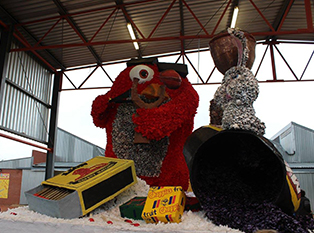
Winning float for 2017: Armentum, Vergeet-My-Nie,
and Emily
Photo: Lelanie de Wet
Although the 75th RAG festivities were challenged by ominous weather, in true Kovsie spirit students and organisers still made a gleaming success of the day.
Students help to create sunny feeling
On 6 February 2017, the annual float-building activities culminated in the handing over of schoolbags to 150 learners from schools in and around Bloemfontein. This took place at the Rag Farm on the Bloemfontein Campus of the University of the Free (UFS), since the morning procession to Twin City Mall in Heidedal had to be cancelled due to bad weather.
“It is of course a huge disappointment to all of us that the events had to be cancelled, but we are grateful for the rain,” said Karen Scheepers, Head of Kovsie Rag Community Service and Assistant Director: Student Affairs.
The evening KFC Rag procession took place as planned, with students having the option of taking part despite the weather. Unfortunately, the Chevrolet Music Festival had to be cancelled.
“The very important actors of today are our students who have worked long hours to build the floats and who have worked together to make this rainy day on the outside feel sunny inside,” said Prof Francis Petersen, incoming UFS Vice-Chancellor and Rector, when he addressed the crowd at the Rag Farm. Prof Petersen will take up office on 1 April 2017.
Armentum, Vergeet-My-Nie, and Emily take honours
Armentum, Vergeet-My-Nie, and Emily Hobhouse were the overall winners of the 2017 Rag float-building. “It was worth the hard work. Always remember to ask for advice during float-building,” said Pieter Kotze, RC Rag of Armentum residence on the Bloemfontein Campus. “I also want to thank both the RC Rag from Vergeet-My-Nie and Emily Hobhouse.”
The float theme was Proudly South African, and the winning float encapsulated it with local flavours such as Chappies, a Rooibos tea box and a Lion matchsticks box. They also went the extra mile by incorporating each hostel’s logo within a Chappie design.
The Central Rag Committee would like to thank all their sponsors who made the events possible. The Rag Coronation Ball will take place on 17 February 2017, where the new Rag Queen and Mr Rag will be crowned.